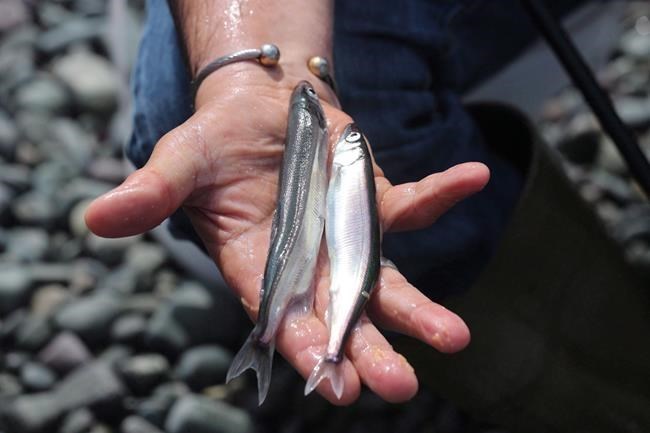Here is a roundup of stories from The Canadian Press designed to bring you up to speed on what you need to know today.
Experts call for pause in N.L. capelin fishery
Marine scientists and conservationists are calling on officials to pause Newfoundland and Labrador's commercial capelin fishery.
The tiny shimmering fish are an important staple in the diets of the whales and puffins that dazzle tourists and residents each summer off the province's coastlines.
Leaving the struggling capelin stock alone to rebuild would only serve the province's hallmark ocean ecosystem, said marine behavioural ecologist Bill Montevecchi, who is a professor at Memorial University in St. John's.
According to the Fisheries Department's classification system, the capelin stock is in the "critical zone," which, according to the department's definition, means removals should be minimal and stock growth should be prioritized. With the exception of 2013 and 2014, it has been in the critical zone since 1991, the department noted in its latest stock assessment.
"When it's in the critical zone, you don't touch it," Montevecchi said. "It doesn't mean, 'Oh, let's go fish it.' "
---
June inflation data due today
Statistics Canada is set to release its June inflation reading this morning.
The consumer price index report is expected to show inflation slowed again last month.
Economists are forecasting inflation fell closer to three per cent, the top end of the Bank of Canada's target range.
Canada's inflation rate was 3.4 per cent in May, down considerably from 8.1 per cent last summer.
Much of the decline in inflation has been due to lower energy prices, while other prices have continued to rise rapidly.
---
B.C. wildfire season grows towards record
British Columbia is encroaching on its worst wildfire season on record as more than 370 fires burn in the province.
BC Wildfire Service figures show wildfires have consumed more than 12,900 square kilometres of land so far this year, with many weeks left in the season, compared with 13,500 square kilometres burned in 2018.
Sophie Wilkinson, an assistant professor in environmental management at Simon Fraser University, says the season is on track to be the worst on record, aggravated by the severe drought in many areas of the province.
Her comments come after Canada's Minister of Emergency Preparedness Bill Blair announced last week that federal assistance, including military resources, were being mobilized to help B.C. in its wildfire fight.
---
Planting thousands of trees a day and being watched by millions
An Ontario tree planter has found an online audience of millions after a video showing her in the process of planting more than 4,500 seedlings in one day went viral.
The video on TikTok and Twitter shows Dart barely breaking stride as she walks across a burnt landscape in Saskatchewan, plunging a small spade into the ground and dropping in a seedling before stomping the hole shut and moving on in a matter of seconds.
The 29-year-old Dart has spent the past three summers planting more than 372,000 trees across Canada.
The British Columbia Ministry of Forests says in a statement that reforestation is a large and important component of the province's forest industry and 1.6 billion trees have been planted since 2017.
Dart says tree planting is physically and mentally exhausting but the results are also incredibly rewarding.
---
Nunavut researchers to explore Mars mystery
A team of researchers is studying methane on a remote Arctic island in the hopes of better understanding the possibility of life on Mars.
Astrobiologist Haley Sapers is an adjunct professor at York University and visiting scientist with the California Institute of Technology.
She is leading the team currently at the McGill Arctic Research Station, or MARS, on Axel Heiberg Island in Nunavut.
Sapers says most methane on Earth is produced by living organisms.
Its presence on Mars could also be evidence of past or present life, or areas that could be inhabited in the future.
To learn more about the gas on Mars, scientists are testing new technology that can take frequent, sensitive measurements of methane on the island
Sapers says the island is home to super-salty cold springs that produce methane -- similar to subsurface conditions on Mars.
---
Canadian cinemas brace for strike slowdown
Canadian movie theatre owners say they're nervously watching for developments in dual Hollywood strikes that could slow the flow of films to their cinemas.
The owners are expecting striking stars represented by the Screen Actors Guild-American Federation of Television and Radio Artists and talent backed by the Writers Guild of America to be on the picket lines for months as they seek better wages and protections from artificial intelligence.
The strikes stand to reduce the number of films that get released as studios and distributors grapple with productions that immediately stopped when the strikes began.
Jeff Knoll, chief executive of Film.ca Cinemas, an Oakville, Ont. theatre says "We barely survived the pandemic...and we are quite nervous about what the future is going to hold with all that's going on in Hollywood right now."
---
This report by The Canadian Press was first published July 18,
2023.
The Canadian Press



